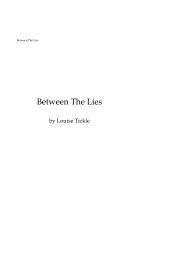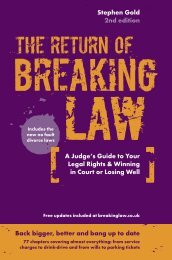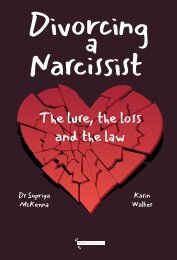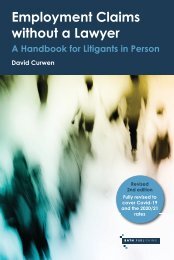Insolvency Made Clear: A Guide for Debtors
Plain English, practical guidance for anyone facing demands over a debt they are struggling to pay.
Plain English, practical guidance for anyone facing demands over a debt they are struggling to pay.
You also want an ePaper? Increase the reach of your titles
YUMPU automatically turns print PDFs into web optimized ePapers that Google loves.
Legal Terms Defined<br />
A ‘disposition’ of an asset is when that asset is sold or given away. It would include<br />
where security is given over that asset.<br />
A ‘distribution’ is a payment. For example, the Trustee in Bankruptcy may make<br />
a ‘distribution’ to creditors, if the bankrupt held sufficient funds.<br />
The ‘equity’ in a house is the value remaining after the mortgage. This will be the<br />
only meaning of the word ‘equity’ in this book.<br />
‘Estate’ has two distinct meanings. For most of this book, ‘estate’ is used to refer<br />
to the belongings of a bankrupt which they do not keep after the making of a<br />
bankruptcy order. This would include cash in the bank, but exclude their tools<br />
of trade. However, ‘estate’ has a wider meaning in Chapter 10 if someone dies,<br />
and refers to all their possessions.<br />
‘Execution’ of a judgment is en<strong>for</strong>cing it: typically this is a bailiff attending to<br />
remove property to sell and pay off the judgment creditor.<br />
A ‘guarantee’ is an agreement to pay someone else’s debts.<br />
A ‘hearing’ is when the parties speak in front of a judge in a court.<br />
An ‘income payments agreement’ (IPA) is an agreement where someone who<br />
is bankrupt agrees to pay future earnings to their Trustee in Bankruptcy. If<br />
the bankrupt does not agree, the Trustee can apply <strong>for</strong> an ‘income payments<br />
order’ (IPO).<br />
An ‘individual voluntary arrangement’ (IVA) is a <strong>for</strong>mal process which, if 75%<br />
of creditors agree, can lead to the debt of a person being reduced or the debtor<br />
being given more time to pay.<br />
‘Insolvent’ means either ‘unable to pay debts as they fall due’; or alternatively<br />
‘debts are greater than assets’. The first definition is usually easier to prove: if<br />
someone is meant to pay a debt but cannot, they are technically insolvent.<br />
An ‘<strong>Insolvency</strong> Practitioner’ (IP) is a qualified professional, similar to a chartered<br />
accountant who specialises in insolvency matters.<br />
An ‘interim order’ protects an individual from their creditors while they try to<br />
pass an individual voluntary arrangement.<br />
‘Interest’ can be either a) additional money which needs to be repaid when<br />
taking out a loan, or b) the right to some part of property. For example, someone’s<br />
interest in a house might be the first £50,000; or an interest under the<br />
Family Law Act 1996 which entitles them to live there. ‘Interest’ can also be used<br />
xxiii













